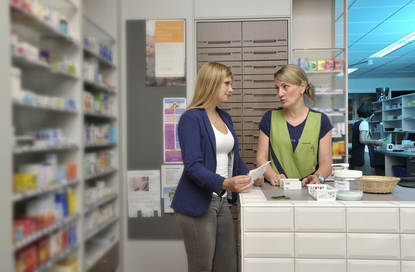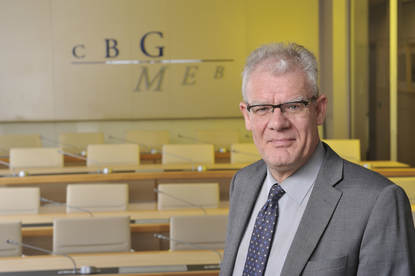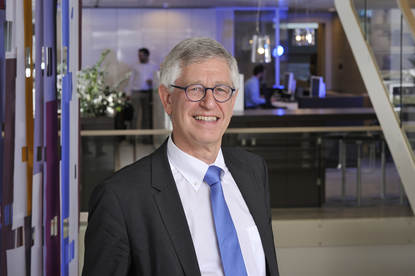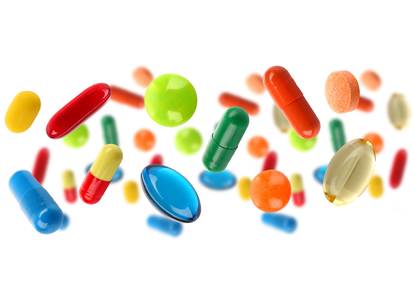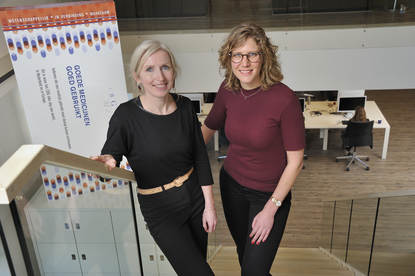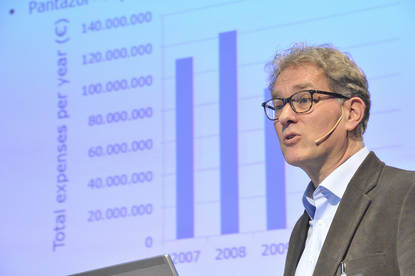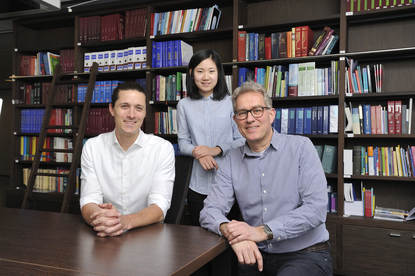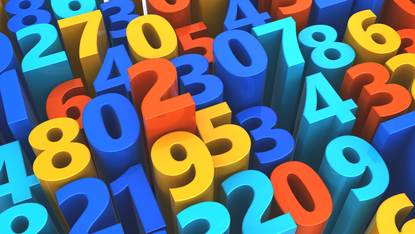To be able to market medicines for human use, a pharmaceutical company requires a marketing authorisation. In the Netherlands, the MEB issues these authorisations for regular medicines and botanicals (herbal medicines).
The MEB aims to play a leading role in the assessment of new medicines within the European network of medicines authorities. With its strong representation in European committees and working groups, the MEB ensures that the interests and needs of Dutch patients are taken into account in European decision-making.
In addition, the MEB aims to speed up the assessment of new (innovative) medicines and to thus contribute to these medicines becoming available sooner for patients who need these medicines.
The year 2017 was characterised by a closer connection with the environment in which the MEB operates. In connection with the authorisation of Medikinet (methylphenidate) for adults with Attention Deficit Hyperactivity Disorder (ADHD), the MEB consulted with various parties to promote the responsible use of this medicine. The MEB held consultations with the Netherlands Psychiatric Association (NVvP), the Dutch College of General Practitioners (NHG) and patient association Impuls/Woortblind. Until 2017, methylphenidate was only approved for children up to the age of 18. There was also a need for this medicine for adults. However, the use of methylphenidate is not without risks for this patient group. It can have psychiatric adverse reactions and users have a higher probability of acquiring cardiovascular diseases. Therefore, during the registration process in Europe, the MEB strongly advocated that the use of this medicine would be subject to a number of conditions. For instance, the medicine must be prescribed by a psychiatrist, an inventory has to be made of the patient's cardiovascular disease risk, and the patient has to be examined regularly. The manufacturer of Medikinet was also required to conduct a study into the cardiovascular and psychiatric risks among adults with ADHD. In view of the serious adverse reactions, the MEB has requested psychiatrist to exercise restraint in prescribing methylphenidate and to follow the instructions in the product information carefully.
In the second half of 2017, Lareb received reports about deviating coagulation values (INR values) in connection with the anticoagulation medicine acenocoumarol. After switching from acenocoumarol manufactured by Sandoz to the same medicine manufactured by Centrafarm, it turned out that the blood of patients coagulated faster or slower than usual. The problems in connection with the anticoagulation medicine acenocoumarol led the MED to contact pharmacists and prescribers.
The MEB had research carried out into both medicines. This did not result into an explanation for the reports. There were no indications that anything was wrong with the quality of acenocoumarol manufactured by Centrafarm. Based on these results, patients were advised about possible fluctuations of the coagulation values when suing this medicine. They were also advised to contact the thrombosis service, their general practitioner or pharmacist if necessary. Healthcare providers were advised to inform patients properly when switching anticoagulation medicines. The MEB will continue to monitor acenocoumarol in the future.
Via the centralised European procedures, 35 positive advices were issued in 2017 for marketing authorisations for medicines with new active substances. The Netherlands was a rapporteur or a co-rapporteur in 15 central European procedures in 2017. With the number of assigned CHMP rapporteurships and co-rapporteurships, the Netherlands ranks among the top five in Europe.
The Netherlands was the Reference Member State (RMS) for 563 completed Decentralised Procedures (DCPs). The Netherlands processes the highest number of RMS applications in Europe as a Reference Member State (around 19% of the total number of reports) in the Mutual Recognition Procedure (MRP) or Decentralised Procedure (DCP). The MRP and DCP are European registration procedures based on the principle of recognition by the Concerned Member States (CMS) of the assessment made by the Reference Member State.
In addition, there were 108 applications via the National Procedure.
After a rising trend for many years, 2017 showed a decrease of nearly 6% in the number of completed procedures.
In the graphs below, you can find a detailed report.
Members of the Medicines Evaluation Board in 2017
MEB Board members
Prof. H.G.M. Leufkens, Chair (until 1 August 2017)
Prof. A. de Boer, Chair (as from 1 August 2017)
Dr B.J. van Zwieten-Boot, Deputy Chair
Prof. P.A. de Graeff, Deputy Chair
Prof. H. Boersma (as from 1 June 2017)
Prof. M.L. Bouvy
Prof. O.M. Dekkers (as from 23 November 2017)
Dr V.H.M. Deneer
Dr A.A.M. Franken (until 1 August 2017)
Prof. G.M.M. Groothuis
Prof. Dr H.J. Guchelaar
Prof. J.M.W. Hazes
Dr P.A.F. Jansen (until 1 January 2018)
Dr C. van Nieuwkoop
Dr J.M.L. van Rensen
Dr C.F.H. Rosmalen (until 29 July 2017)
Prof. F.G.M. Russel
Dr G.S. Sonke
Secretary
MSc H.R. Hurts
(Second) Secretary
MSc A.G. Kruger-Peters (until 1 January 2018)
MSc I.M. Mulder- van Dam
Dr D.S. Slijkerman
MSc F.W. Weijers
Dr J.W. van Wijngaarden
Committee for Advanced Therapies (CAT)
Dr J.H. Ovelgönne
Dr C.A. Herberts (alternate)
Committee for Medicinal Products for Human Use (CHMP)
Prof. H.L. Hillege
Dr P.B. Hennik (alternate)
Co-ordination Group for Mutual Recognition and Decentralised Procedures (human) (CMDh)
MSc K.H. Doorduyn-van der Stoep
P. Schoondermark, MPhil
Committee for Orphan Medicinal Products (COMP)
Dr V. Stoyanova
Paediatric Committee (PDCO)
Dr M. van Dartel
For information about the Pharmacovigilance Risk Assessment Committee (PRAC) see ‘Pharmacovigilance in connection with practice’.
An overview of several key figures is provided below. This is not a complete overview of all activities that fall under medicines for human use.
Medicinal products for human use 2017 - Regular medicinal products
Medicines may be authorised for the market via a Centralised Procedure (CP), a Decentralised Procedure (DCP), a Mutual Recognition Procedure (MRP), or a National Procedure.
Positive assessments for marketing authorisations for medicinal products with a new active substance authorised via the Centralised procedure
| Authorised medicinal products new active substance | |
|---|---|
| 2017 | 35 |
| 2016 | 27 |
| 2015 | 43 |
| 2014 | 35 |
| 2013 | 40 |
The list of active substances in 2017 is published in Appendix A.
New applications via the Decentralised procedure (DCP)
| DCP-RMS | DCP CMS | |
|---|---|---|
| 2017 | 563 | 252 |
| 2016 | 457 | 280 |
| 2015 | 479 | 356 |
| 2014 | 514 | 334 |
| 2013 | 377 | 234 |
The number of applications with the Netherlands as Reference Member State (RMS) increased. The MEB handles the most RMS applications within Europe. The number of applications for Decentralised Procedures with the Netherlands as Concerned Member State (CMS) also decreased further compared with 2016. The numbers stated here are the total number of new applications via DCP including all copies and dosages.
New applications via the Mutual recognition procedure (MRP)
| MRP RMS | MRP CMS | |
|---|---|---|
| 2017 | 12 | 64 |
| 2016 | 21 | 69 |
| 2015 | 19 | 58 |
| 2014 | 19 | 32 |
| 2013 | 20 | 36 |
The number of MRP procedures with the Netherlands as Reference Member State has decreased, after being around 20 for a number of years and the number of MRP applications with the Netherlands as CMS decreased slightly.
New applications via the National procedure
| National applications | Parallel import products | |
|---|---|---|
| 2017 | 108 | 465 |
| 2016 | 55 | 437 |
| 2015 | 112 | 390 |
| 2014 | 147 | 338 |
| 2013 | 141 | 367 |
The number of applications via the National Procedure (including duplex applications) increased in 2017, after 2016 showed a decrease. The number of national applications for parallel import products increased slightly compared with 2016.
Authorised medicinal products
| Authorised medicinal products | |
|---|---|
| 2017 | 14067 |
| 2016 | 14011 |
| 2015 | 13851 |
| 2014 | 14023 |
| 2013 | 14271 |
The total number of authorised medicinal products has increased slightly relative to 2016. In the Netherlands, the number of products for which a marketing authorisation has been granted has remained constant for years at around 14,000.
Number of completed procedures
| Number of completed procedures | |
|---|---|
| 2017 | 23991 |
| 2016 | 25480 |
| 2015 | 23274 |
| 2014 | 19765 |
| 2013 | 22077 |
The number of completed procedures decreased in 2017.
New marketing authorisations
| New marketing authorisations | Parallel import products | |
|---|---|---|
| 2017 | 884 | 431 |
| 2016 | 792 | 413 |
| 2015 | 833 | 313 |
| 2014 | 742 | 311 |
| 2013 | 853 | 379 |
The number of new marketing authorisations (National, Duplex, MRPs and DCPs) on an annual basis increased again in 2017, after a decrease in 2016. The number of national marketing authorisations for parallel import products increased further in 2017.
Variations in existing marketing authorisations
| Variations to existing marketing authorisations | |
|---|---|
| 2017 | 12458 |
| 2016 | 12810 |
| 2015 | 13496 |
| 2014 | 12477 |
| 2013 | 12895 |
The number of procedures in which a variation is implemented in the authorised dossier decreased further in 2017 compared with previous years.
Marketing authorisation refusals
| Number of products | |
|---|---|
| 2017 | 15 |
| 2016 | 4 |
| 2015 | 7 |
| 2014 | 2 |
| 2013 | 4 |
In the majority of cases, the handling of applications for a marketing authorisation by the MEB leads to adjustments in the dossier as a result of questions and requirements that the MEB sets during the application process. This may concern adjustments to applications for indications, dosages, formulations, the production process or any other part of the dossier relevant to the prescriber and the patient. If the applicant is not able to answer the questions or cannot satisfy the requirements stipulated by the MEB, the application can be withdrawn during the procedure (the number has not been provided).
Therefore, the number of applications that leads to a full refusal is relatively low; however, this did increase in 2017. This concerns applications that actually lead to a refusal.
Withdrawals of marketing authorisations
| Marketing authorisations | Parallel import products | |
|---|---|---|
| 2017 | 741 | 500 |
| 2016 | 613 | 441 |
| 2015 | 667 | 646 |
| 2014 | 724 | 376 |
| 2013 | 758 | 220 |
This graph illustrates the number of requests for withdrawal of existing marketing authorisations. The number of requests for withdrawal increased in 2017, following a decrease in 2016. For parallel import products, the number of requests to withdraw existing marketing authorisations also increased in 2017, after a decrease in 2016.
Role of the Netherlands in European committees
| NL Coordinator Scientific Advice | NL Rapporteur Paediatric Investigation Plan | NL (Co-) Rapporteur CHMP | NL Rapporteur orphan medicinal product status | NL (Co-) Rapporteur CHMP referral | |
|---|---|---|---|---|---|
| 2013 | 69 | 37 | 15 | 9 | 6 |
| 2014 | 72 | 35 | 24 | 13 | 5 |
| 2015 | 86 | 46 | 22 | 8 | 9 |
| 2016 | 101 | 23 | 18 | 21 | 6 |
| 2017 | 124 | 8 | 15 | 14 | 1 |
This overview shows that the MEB is strongly represented at the European Medicines Agency (EMA). The MEB plays a large role in important European procedures and influential committees. The number of coordinatorships for Scientific Advices rose compared with last year. The number of CHMP reporterships for central applications, PIPs procedures, CHMP referrals and reporter assigning status orphan medicines decreased. (see overviews below).
